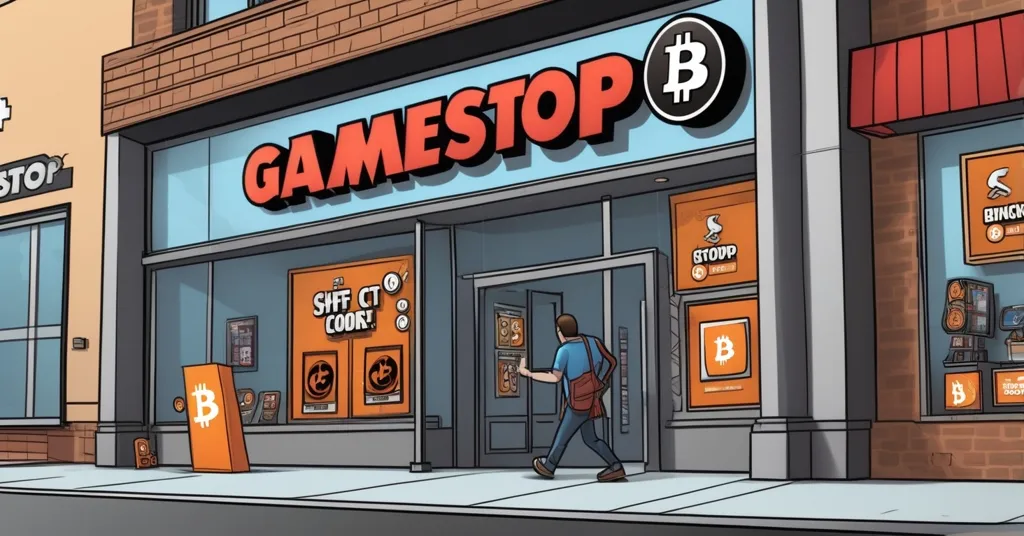GameStop Raises $1.5B, Shifts to Bitcoin Amid Store Closures

GameStop’s Bold Leap: $1.5B in Bitcoin as Retail Strategy Shifts
GameStop, once the epicenter of the meme stock frenzy, is now betting big on Bitcoin, raising $1.5 billion through a convertible debt offering to pivot from physical retail to the digital realm.
- GameStop raises $1.5B via convertible debt
- Proceeds to fund Bitcoin acquisition
- Over 1,000 store closures worldwide
- Stock sees mild reaction post-announcement
GameStop announced a $1.5 billion convertible debt offering, surpassing its initial target of $1.3 billion. This strategic move will see the company trading in its game controllers for crypto keys, using a portion of the proceeds to acquire Bitcoin. The notes issued will mature on April 1, 2030, and while they don’t bear regular interest, they can be converted into stock under certain conditions. In their SEC filing, GameStop stated, “The company expects to use the net proceeds from the offering for general corporate purposes, including the acquisition of Bitcoin in a manner consistent with the Company’s Investment Policy.”
The decision to invest in Bitcoin comes as GameStop continues to close its physical retail locations, with approximately 1,000 stores shuttered worldwide over the past year. This includes significant closures in the US, Europe, Canada, and Australia. The shift away from physical retail is driven by the rise of digital game downloads and streaming services, which have reduced the need for brick-and-mortar stores.
Despite the bold move, GameStop’s stock experienced only a mild increase of 1.34% following the announcement, though premarket trading saw a more significant 16% surge. This volatility reflects investor uncertainty about the company’s new direction. Analyst Neil Saunders from GlobalData Retail commented on this strategy, saying,
“The pivot to Bitcoin is really a defense against irrelevance. It’s an odd thing as it’s basically saying the strategy isn’t retail but to act as some kind of cryptocurrency investment vehicle.”
GameStop’s venture into Bitcoin is not just a diversification strategy but a hedge against the decline in physical retail sales. By investing in Bitcoin, the company is betting on the future of digital assets and hoping to stay relevant in an industry that’s rapidly evolving. However, the mild reaction from the stock market suggests that investors are still uncertain about the long-term viability of this strategy.
This move aligns GameStop with a growing list of companies exploring cryptocurrency investments as a means to diversify and hedge against industry-specific challenges. As more companies follow suit, we may see a new era of corporate Bitcoin adoption, potentially sparking a bull run in the cryptocurrency market. Yet, market skepticism remains, with experts emphasizing the importance of trust and execution in GameStop’s new strategy.
The strategic implications of GameStop’s Bitcoin investment could extend beyond the company itself, potentially influencing traditional finance (TradFi) and encouraging other corporations to follow suit. The timing of GameStop’s Bitcoin accumulation is crucial, as it could signal a new era for companies looking to enter the cryptocurrency market.
From a Bitcoin maximalist perspective, GameStop’s move aligns with the belief in Bitcoin’s potential as a future reserve currency. While Bitcoin maximalists advocate for Bitcoin as the ultimate store of value, they also recognize the role of other cryptocurrencies and blockchain technologies in filling niches that Bitcoin may not serve as effectively.
However, there are risks to consider. Bitcoin’s volatility could impact GameStop’s financial stability, and the company’s success in this new venture will depend on its ability to navigate the crypto market effectively. Critics might argue that GameStop’s move is a Hail Mary pass to stay relevant in a world where physical game stores are becoming as outdated as dial-up internet.
GameStop’s strategy could involve using Bitcoin as a store of value or even integrating it into their digital platform, perhaps accepting it as payment for digital goods. This could open new revenue streams and enhance their digital presence, but it’s a gamble that requires careful execution.
As GameStop navigates this new path, it’s clear that the company is not just playing defense but also trying to redefine its future. Whether this strategy will pay off remains to be seen, but one thing is certain: GameStop is betting big on Bitcoin, and the crypto world is watching closely.
Key Questions and Takeaways
What is GameStop’s new strategy involving Bitcoin?
GameStop is using part of the $1.5 billion raised from a convertible debt offering to purchase Bitcoin, as part of a broader strategy to diversify its revenue streams and hedge against the decline in physical retail sales.
How has GameStop’s stock reacted to the Bitcoin investment announcement?
GameStop’s stock experienced a mild increase of 1.34% following the announcement, but showed volatility in the days surrounding the news, reflecting investor uncertainty.
Why is GameStop closing its physical stores?
GameStop is closing its physical stores due to changing consumer habits, with more gamers opting for digital game downloads and streaming services, reducing the need for physical retail locations.
What is the significance of GameStop’s move into Bitcoin?
The move into Bitcoin is significant as it represents a shift from traditional retail to cryptocurrency investments, seen as a strategy to diversify and protect against the declining relevance of physical game stores.
How does GameStop’s Bitcoin investment compare to other companies?
GameStop’s Bitcoin investment follows the trend of other companies, like MicroStrategy (now Strategy), using Bitcoin as a reserve asset to diversify and hedge against industry-specific challenges.



